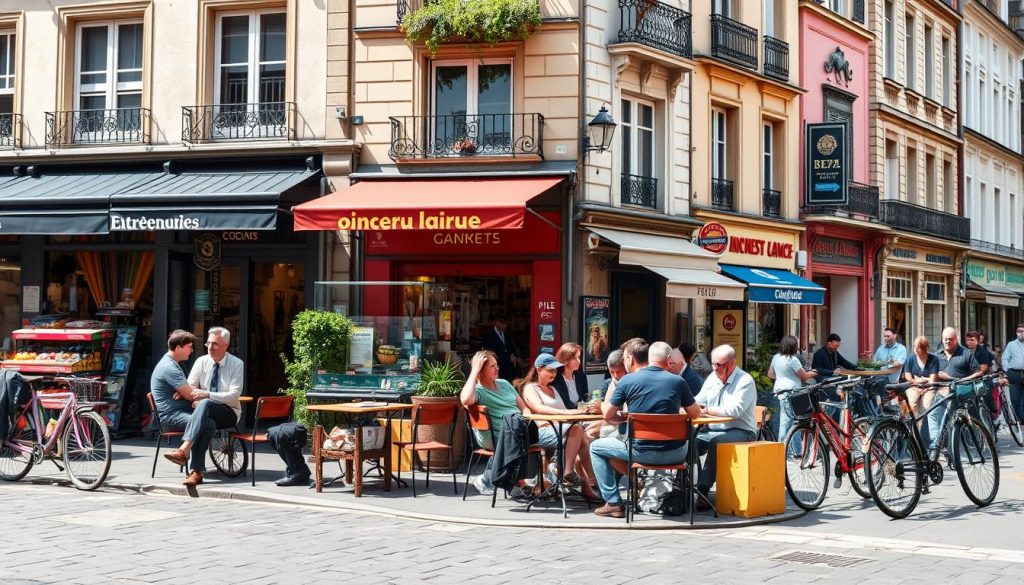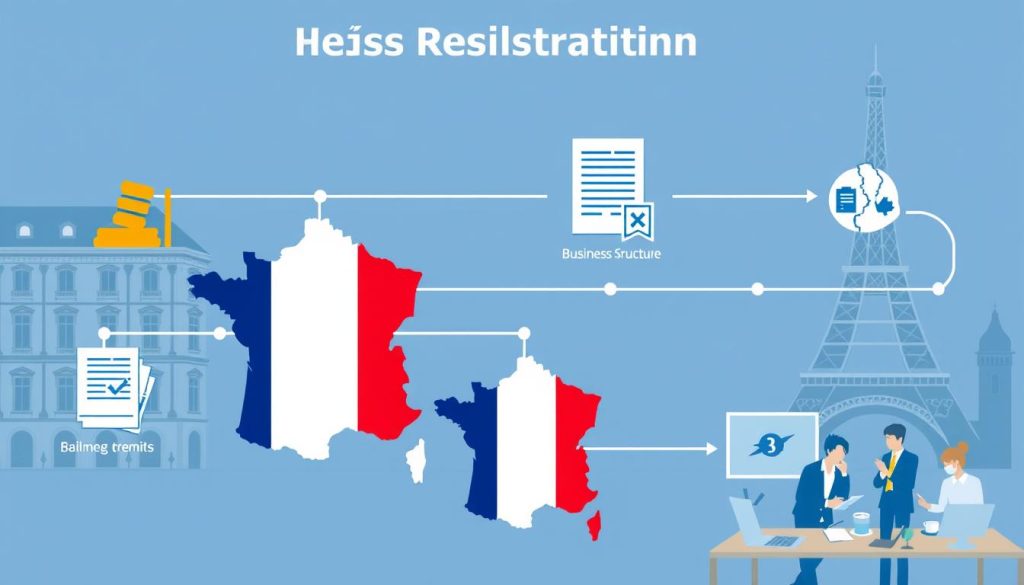Starting a business in France is an exciting chance for UK entrepreneurs. This guide will give you key insights into the French market. It will also help you understand the business culture and rules in France.
- Introduction to Entrepreneurship in France
- Understanding the French Market
- Doing Business in France: Key Regulations and Laws
- The Process of Setting Up a Business in France
- Corporate Taxation in France
- Navigating Employment Laws in France
- Understanding French Culture and Business Etiquette
- Financing Your Business Venture in France
- Building a Local Network in France
- Marketing Your Business in the French Market
- Challenges to Consider When Doing Business in France
- The Role of Technology in Business in France
- Understanding Consumer Behaviour in France
- Legal Considerations for Foreign Investors in France
- Success Stories of UK Entrepreneurs in France
- Resources for Entrepreneurs in France
Knowing the French business scene well is crucial. It helps UK business owners follow the rules and fit in with the culture. This way, they can succeed in this lively economy.
Introduction to Entrepreneurship in France

Entrepreneurship in France has seen big changes lately. Start-ups are booming in a lively scene that loves new ideas. The help from government and private groups is key for UK entrepreneurs wanting to grow.
Fields like tech, healthcare, and green energy are growing fast. Start-ups are big for the French economy, creating jobs and pushing tech forward. They also help keep the market competitive.
Investing in research and development is a big deal. It lets entrepreneurs use the latest tech. The growth of digital strategies and the French Tech movement show how strong entrepreneurship is.
Finding money is important for success. Many venture capital firms and angel investors want to back good ideas. With a good economy, UK entrepreneurs have lots of chances in France.
Understanding the French Market

The French market has its own special traits that entrepreneurs need to understand. A deep dive into market analysis shows how French consumers behave. This knowledge is key for making smart business plans.
French shoppers often look for quality, ethical products, and unique experiences. These are vital for getting into the market.
Different sectors play big roles in France’s economy, offering chances for UK businesses. Key areas include:
- Technology and Innovation
- Luxury Goods
- Food and Beverage
- Tourism and Hospitality
It’s important to keep up with market trends to succeed in France. Trends show changes in what people want, like more sustainable and healthy options. This means a rise in demand for organic and local products.
Using data from INSEE, Euromonitor, and MarketLine helps businesses make smart choices. By following successful strategies, companies can meet French consumer needs better.
Doing Business in France: Key Regulations and Laws

Entrepreneurs planning to start a business in France need to know the key rules. These rules help ensure fair trading and protect consumers. They also provide a structure for how businesses should operate.
The French Commercial Code outlines the legal framework for businesses. It covers how to start and run a business. This includes rules on forming companies, getting licenses, and following operational standards.
Businesses also have to follow European Union laws. These laws affect many areas, like trade, employment, and the environment. Knowing both French and EU laws is crucial for success.
Compliance involves many things, like financial reports, VAT, and employee rights. Entrepreneurs must have clear plans to follow these rules. Getting help from legal experts in French business law can be very helpful.
The Process of Setting Up a Business in France

Starting a business in France needs a clear plan. You must pick the right business structure and know how to register your company. UK entrepreneurs should learn about the different business types and their costs. This will help them smoothly enter the French market.
Choosing the Right Business Structure
The business structure you choose is key. It affects your liability, taxes, and rules you must follow. Here are the main options:
- Sole Proprietorship: You run the business by yourself. It’s easy to start but you could lose personal money.
- Partnership: You share profits and work together. It’s good for sharing costs but needs a clear plan to avoid fights.
- Limited Company: This protects your personal money. It’s more complicated to start and has strict rules.
Registration Procedures and Costs
Registering your business in France has several steps and costs. To register, you need to:
- Decide on a business structure and name.
- Fill out the right forms, depending on your business type.
- Send the forms and documents to the local chamber of commerce or French Business Formalities Centre.
- Pay any fees for registration, which vary by structure.
- Get a K-bis extract, your official business certificate.
Think about the costs of starting up, like legal fees and marketing. Planning these costs well can help your business succeed in France.
Corporate Taxation in France

Knowing about corporate taxation in France is key for entrepreneurs starting a business. The French tax system has many parts that can help or hinder a company’s finances. It’s crucial for entrepreneurs to understand the tax rates and deductions that can change their tax load.
Overview of Corporate Tax Rates
The standard corporate tax rate in France is 25%. Most companies pay this rate. However, small businesses can pay 15% on profits up to €38,120. It’s vital for businesses to keep up with these rates as they can change due to economic shifts and government policies.
Deductions and Incentives for Start-ups
Start-ups in France get tax breaks to help them grow. These include:
- Research and development tax credits that cover up to 30% of eligible R&D costs.
- Exemptions for start-up costs that can reduce taxable income.
- Regional tax breaks to boost economic activity in certain areas.
These tax benefits can make start-ups more financially stable. They help start-ups use their resources better as they expand.
Navigating Employment Laws in France

For UK entrepreneurs in France, knowing employment laws is key. The French Labour Code explains employee rights well. These rights are strong, unlike in many other places. Employers need to know these to stay out of trouble.
When you want to hire in France, you must follow certain steps. It’s important to understand:
- Employment contracts are a must. They should list job duties, pay, and more.
- Contributions to social security are needed. They cover health and retirement.
- Recruitment ads must follow anti-discrimination laws.
Also, knowing about different employment contracts is vital. There are permanent and fixed-term contracts, each with its own rules. Grasping these can help build good relationships with employees.
Creating a good work place is important. It meets legal standards and makes employees happy. Following employment laws protects workers’ rights. It also improves your company’s image and work output.
Understanding French Culture and Business Etiquette

French culture is key in business interactions. Entrepreneurs working with French partners need to know the cultural norms and values. These shape how relationships grow and meetings are run, affecting business success.
Key Cultural Norms and Values
In France, being formal and respectful is crucial in work settings. Partners expect titles and surnames, showing respect for hierarchy. Other cultural norms include:
- Punctuality is valued; being late is seen as disrespectful.
- Face-to-face meetings are preferred over emails to build relationships.
- Talking about personal matters before business is common.
Meeting Conduct and Communication Styles
Success in business meetings comes from following etiquette rules. French communication is indirect, so paying attention to non-verbal signals is important. Key points to remember are:
- Start meetings with a firm handshake and keep eye contact steady.
- Present ideas clearly and logically, as the French value well-structured arguments.
- Be ready for critical questions; they’re not personal but part of evaluating business.
Financing Your Business Venture in France

For entrepreneurs starting a business in France, knowing about funding options is key. There are many ways to get money, like loans, venture capital, and angel investors. It’s important to find the right one for your business. You should look into what’s available, who can help, and how to apply.
Overview of Funding Options
In France, you can get funding in several ways:
- Traditional bank loans offer good rates for established businesses.
- Venture capital firms invest in start-ups with big growth plans.
- Angel investors give money for equity or debt.
- Crowdfunding lets you get support from many people.
Government Grants and Loans for Entrepreneurs
Government help is big for businesses through grants and loans. Some key places include:
- Bpifrance: This public bank has grants and loans for entrepreneurs to grow and innovate.
- European Investment Bank: It helps EU investment, including for UK entrepreneurs.
- Business France: This agency helps international entrepreneurs find grants and learn about rules.
Building a Local Network in France

For UK entrepreneurs, building a strong network in France is key. It opens doors to new opportunities, insights, and partnerships. Knowing the French culture is crucial for effective networking.
Here are some strategies to build a local network:
- Use LinkedIn to connect with professionals and organisations in your field.
- Join the French Chambers of Commerce for support, resources, and introductions.
- Go to local meet-ups and networking events on MeetUp to meet entrepreneurs and business leaders.
Creating local partnerships can greatly improve your business’s visibility and trustworthiness. Being active in the community and attending events can lead to successful collaborations. Focus on growing these relationships for long-term success in France.
Marketing Your Business in the French Market

To market well in France, you need to know what French people like. Entrepreneurs should make marketing plans that speak to their audience. Using both old and new ways to promote can help your brand stand out. Advertising in France is key to grabbing people’s attention. Also, social media is great for talking to customers and building loyalty.
Effective Advertising Strategies
In France, good ads use different methods. Here are some tips:
- Use local languages and cultural references to connect with people.
- Make ads that tell stories to touch hearts.
- Add a bit of humour and charm, as French people love it.
- Target ads to the right people, based on who they are and what they like.
Adapting to local tastes can make your ads more effective and well-received.
Utilising Social Media for Brand Awareness
Social media is a powerful tool for businesses in France. Sites like Facebook, Instagram, and LinkedIn are key for connecting with customers. Here are some strategies:
- Get people involved with interactive content, like polls and quizzes.
- Share content made by your followers to build trust and community.
- Use targeted ads to reach the right groups.
- Look at how well your content is doing to make it better.
Brands that use social media well can get more visibility and talk to customers more. This builds a strong base for growth and loyalty.
Challenges to Consider When Doing Business in France

Starting a business in France can be tough for foreign entrepreneurs. It’s important to know the challenges to succeed. Common problems include cultural differences, complex rules, and tough competition.
Common Pitfalls for Foreign Entrepreneurs
Foreign business owners in France face unique hurdles. Knowing these can help avoid problems:
- Cultural Misunderstandings: Not understanding local customs can cause bad communication and harm relationships.
- Bureaucratic Hurdles: The French system can be very complex, leading to delays in getting permits.
- Competition: Foreigners might not realise how fierce the local competition is. Doing good market research is key.
- Language Barriers: Not speaking French well can make it hard to talk to local partners.
- Regulatory Compliance: Dealing with all the rules can be overwhelming. Getting good legal advice is crucial.
The Role of Technology in Business in France

Technology is changing the way businesses operate in France. Digital transformation is key for companies wanting to be more efficient and competitive. By embracing new technologies, businesses can make their processes smoother and meet market needs better.
Companies are using technologies like artificial intelligence, cloud computing, and big data analytics. These tools help in making better decisions and improving how things work. For example, many French businesses use smart automation to boost productivity and cut costs. Using these technologies is not just a way to stay ahead but also a key part of modernising.
Technology also plays a big role in improving customer service. Businesses that use digital tools for customer interaction see happier customers. New things like mobile apps and online stores have changed how businesses talk to their customers, making services more personal.
As French businesses move through the digital world, keeping up with new tech is crucial. Adopting these innovations helps companies work better and stay ahead in a changing market. The focus on digital transformation is a great way for businesses to succeed in France.
Understanding Consumer Behaviour in France

Looking into consumer behaviour in France shows us a lot about shopping trends and what people like. French shoppers have their own ways of making choices, which is key for businesses to get. By adjusting their plans to fit these unique habits, companies can win over customers and stay loyal.
Trends and Preferences
Studies show that consumer behaviour is changing, thanks to culture and new tech. The main trends are:
- More people are shopping online because it’s easy and convenient.
- There’s a big push for products that are good for the planet.
- Customers want shopping experiences that are made just for them.
- They also care a lot about the brand and where things come from.
How to Conduct Market Research
Doing good market research is crucial to keep up with what consumers want. Companies can use different ways to learn from their customers, such as:
- Surveys and questionnaires to get direct feedback.
- Focus groups to really understand what people think and feel.
- Looking at sales data to spot patterns in buying habits.
- Checking out social media to see what’s trending and what people are saying.
Legal Considerations for Foreign Investors in France

Entering the French market needs a deep understanding of legal matters. It’s important to know about protecting intellectual property and how to solve disputes. Knowing these laws can greatly help your business succeed in France.
Intellectual Property Rights
Protecting intellectual property is key to staying ahead. France has strong laws to protect it, following European Union rules. Investors should register trademarks, patents, and copyrights with the National Institute of Industrial Property (INPI).
This step gives legal protection against copying and keeps your innovations and brand safe.
Dispute Resolution and Arbitration
Understanding how to solve disputes is vital for foreign investors in France. Commercial issues can pop up, so knowing how to handle them is crucial. Many choose arbitration, using bodies like the ICC International Court of Arbitration, for quick and private solutions.
Being familiar with these methods helps protect your business interests. It prevents small issues from becoming big problems.
Success Stories of UK Entrepreneurs in France

UK entrepreneurs have made big strides in France. Their success shows the power of resilience, adaptability, and smart planning. These stories give great insights into doing well in the French market.
A tech start-up from the UK focused on French customers. It quickly built a loyal customer base in just three years. This shows how crucial it is to know what customers want.
A UK restaurant chain also made a mark in France. It mixed British and French food, drawing in many different people. This success highlights the value of blending cultures in the food world.
- Adapting marketing strategies to appeal to local customers.
- Building relationships with French suppliers and partners.
- Engaging in community initiatives to enhance brand visibility.
These examples show what UK entrepreneurs can achieve in France. Their stories motivate others to explore France’s lively economy.
Resources for Entrepreneurs in France
For entrepreneurs wanting to start in France, using business resources is key. Business France is a big help, guiding foreign investors through the French market. They offer market studies, sector reports, and advice on rules, helping new businesses get off the ground.
The French Embassy in the UK also helps a lot. They give info on legal setups, funding, and cultural tips for France. They also help entrepreneurs meet local contacts, which can boost their chances of success.
Startup France is another great place for new entrepreneurs. It supports innovation and entrepreneurship with programs and incubators. Through Startup France, entrepreneurs can find important services, suppliers, and partners, making starting and growing a business easier.

